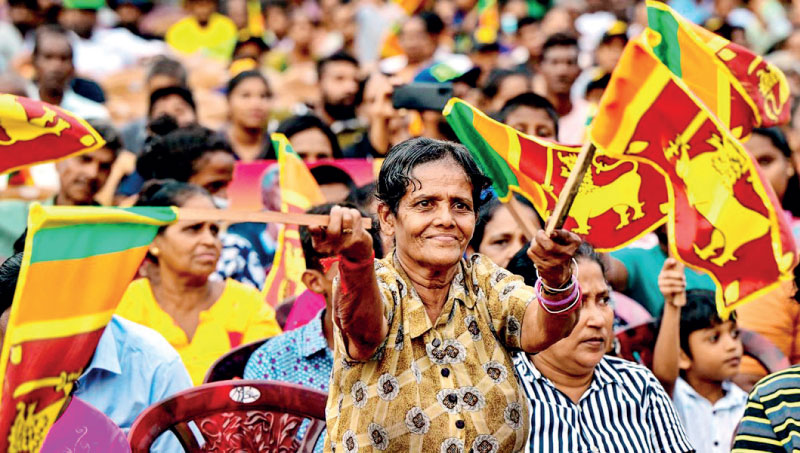Sunday Feb 22, 2026
Sunday Feb 22, 2026
Monday, 2 December 2024 00:00 - - {{hitsCtrl.values.hits}}

The manifesto of the NPP should essentially be the basis for preparing the strategic plan, as it is the document that formed a social contract between the NPP and the people of the country at the Presidential and Parliamentary elections
|
Whence comes the power of words? Citizens of purportedly civilised nations have come under the sway of the rhetoric of demagogues. Soldiers have killed and been killed following the orders of military superiors. Leaders of some religious sects have put people to death for utterances labelled blasphemous or heretical. Leaders of others have taken their own and their followers’ lives with words of salvation on their lips. Yet were my next words to promise you immortality in good health and prosperity in a world of intellectual challenge, amusement, and good fellowship, asking nothing more in return than a portion of your current worldly goods, I doubt you would take up my offer. Some in our culture, however, do give things over to or do things for those who say they guarantee eternal bliss in exchange. Why are so many so susceptible to such verbal behaviour?
– A. Charles Catania, University of Maryland, Baltimore County (https://www.researchgate.net/publication/284994932_Verbal_Governance_Verbal_Shaping_and_Attention_to_Verbal_Stimuli)
 The new NPP Government has just taken shape and an NPP President has been in office for just two months. It is too early, and it is not fair to level criticism for not “meeting election promises” without giving the new President and the new Government time to settle in and formulate their policies and action plans. The resounding victory achieved by the NPP gives them a hitherto unparalleled opportunity to lift the country from the economic, fiscal and social morass it is in, and has been in for a long time.
The new NPP Government has just taken shape and an NPP President has been in office for just two months. It is too early, and it is not fair to level criticism for not “meeting election promises” without giving the new President and the new Government time to settle in and formulate their policies and action plans. The resounding victory achieved by the NPP gives them a hitherto unparalleled opportunity to lift the country from the economic, fiscal and social morass it is in, and has been in for a long time.
It is also beneath the dignity of Sri Lankans to be looking for unseen hands who brought the President and the NPP to power in the new Parliament, rather than accepting that whoever who may have had a hand in it, that ultimately, it’s the people, though their democratic right and choice, that gave them the victory. The fact that the NPP won in 21 out of 22 districts in the country is evidence of how this choice was exercised.
This article is not a partisan political discourse but hopefully a discourse related to governance. In this context, it wishes to urge the NPP Government to move away from verbal promises at the earliest and develop a governance plan based on their manifesto, giving priority among other things, to economic management, fiscal management, export development, foreign investment, education and health and technology developments and agriculture. It is suggested that the governance plan is developed as a strategic plan spanning five years, with immediate, short to medium- and longer-term goals and objectives, specific actions to achieve the goals and objectives and yearly deliverables.
Such a document will provide a sense of direction under the NPP regime to their own ministers and deputy ministers, and to the people, and it will provide the certainty and confidence that investors, both local and foreign will have, to invest in the country. Very importantly, such a plan, monitored hopefully by the President’s or the Prime Minister’s office and the progress made public, could give confidence to the younger generations in the country that they may have a future for them in the country, rather than working towards leaving the country.
Strategic planning and regional development
A strategic plan for governance in Sri Lanka needs to incorporate multi-level governance considering the governance structure in the country.
The inclusive participation of provincial councils and local government entities in the strategic planning process and thereafter in the implementation of the plan to enhance regional development is vital. The manifesto of the NPP should essentially be the basis for preparing the strategic plan, as it is the document that formed a social contract between the NPP and the people of the country at the Presidential and Parliamentary elections.
Planning strategically at all levels of governments
As stated by the OECD and depicted in the diagram below, “effective strategy setting for regional development is a long and complex process. It requires a broadly agreed-upon vision, realistic objectives, high-quality data, and mechanisms to capture synergies across sectors. It also depends on a system to prioritise programs and plans and ensure that regional development initiatives are clear, targeted, and achievable” (https://www.oecd.org/en/topics/sub-issues/strategic-planning -and-regional-development.html).
In the context of undertaking a strategic planning process in Sri Lanka, it is useful to consider the long-term planning process of China and learn lessons from their experience. As noted in the Wikipedia (https://en.wikipedia.org/wiki/Fourteenth_five-year_plan#:~:text =The%2014th% 20 Five%2DYear%20Plan,It%20was%20drafted%20during%20the) its 14th Five-Year Plan, officially the ‘14th Five-Year Plan for Economic and Social Development and Long-range Objectives Through the Year 2035 of the People’s Republic of China’, is a set of Chinese economic development goals designed to strengthen the national economy between 2021 and 2025.
It was drafted during the fifth plenum of the 19th Central Committee of the Chinese Communist Party (CCP) held from 26 to 29 October 2020. The Chinese governance plans span long periods of time, and they have long term objectives while shorter five-year plans, are developed to move the country along its long-term path and objectives.
In Sri Lanka, rhetoric needs to give way now to planning for the next five years and beyond. Constant changes of governments, an outcome of people’s choice in a democracy, have basically come about as those who had governed the country in the past had not made the economic and social outcomes wished for by the people based on the promises made to them. Manifestos were mere words and hardly ever presented to the people as plans of action. Besides this, governance was a top-down exercise and had no grass root input or participation. People were hardly ever told the truth, and they lived in a mirage presented to them in manifestos.
A publicly available, regularly monitored and updated strategic plan, where achieved outcomes or reasons for not meeting outcomes are truthfully told to the public, will change the mirage mentality to one of reality. Stating the truth however is paramount to make this happen as politically convenient untruths will be of no benefit to the people and the country and the strategic planning exercise will be a waste of time.
A strategic planning summit
It may be opportune for the NPP Government to organise a series of planning summits involving a variety of stakeholders including representatives from the Central Bank, commercial banks, private sector, universities, health and education sector, research entities, women’s organisations, unions, provincial and local government sector and other relevant sectors, including diaspora representatives, to seek the active participation and contributions from them towards the most opportune and economically and socially feasible way to develop a long term vision and objectives for the country and how an initial strategic plan could be developed that represents the ownership of stakeholders.
Budgeting process essentially needs to be based on such a strategic plan in order to provide the reality that is needed for the plan, and to bring in accountability to the process of implementation. Such a summit could be the forerunner to a similar planning process for formulating a new Constitution for the country that is a key plank presented to the people by the NPP.
In order to make the strategic planning process a practical and realistically achievable exercise, it is suggested that the NPP manifesto, no doubt formulated and presented to the people after much research, is used as the basis for discussions at the proposed summits.